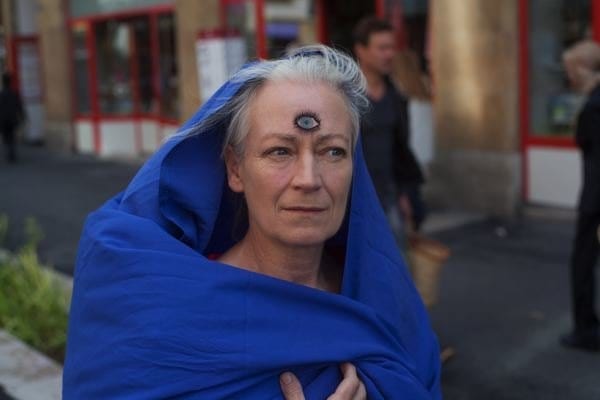Date(s)
- 5 juillet 2014 – Centre d'Art – Neuchâtel (CH)
Vidéos
https://player.vimeo.com/video/145970715 https://player.vimeo.com/video/145976352C’est fantastique
A project by Massimo Furlan, Numero23Prod.
Performance for the Art Center of Neuchâtel (CH) – Created on July 5th 2014
Image, scenario:
A tractor pulls a caravan through the streets of Neuchâtel. In that caravan stands a singer. It is summer and the city is hosting the International Fantastic Film Festival. The performance, which experiments with duration and plays with concepts of voice and address begins in the morning and goes on uninterrupted until midnight. During that time, Massimo Furlan performs a single song, a litany like some sort of trance-pop song…
This is the story of a voice that rises and soars through the city, an exasperating voice that appears and disappears again.
During his long trip, the singer is backed by a series of singers and musicians who change as the hours go by. The singer too changes his appearance, while the backing musicians appear like pale ghosts that are invisibly present.
The caravan travels through the city, appearing under a bridge or on the outskirts of town, and then moves again. Like a never-ending nightmare the song never stops.. It’s always the same singer with the same voice, in front of a crowd, at the market, under a bridge and on the lakeside. Time passes and the song goes on. Then night falls and the caravan continues moving like a ghost in the night. It appears in the distance on the lake. A barge drifts slowly, carrying the caravan, the singer, the ghostly backing singers and musicians. The same tired and burnished song can be heard over and over again,. The barge passes in front of the city and drifts away slowly, disappearing over the horizon and into the darkness. A faint noise is all that remains. Later, a boat sets out to find it, leaving the port and joining the barge. That’s the finale.
The protagonists:
The caravan: it evokes pictures of a moving house, of camping, holidays and summer. It also conjures up terrifying childhood memories of the traveling circus and its parade of outlandish freaks and morbid wonders. Finally, it alludes to those tiny shabby theatres, with puppet shows, bizarre costumes and odd characters performing a series of incomprehensible gestures. Like a bubble of imagination, a nightmare on wheels…
The singer: The Grape Harvest Fair is well known in Switzerland, with its pitiful singers aiming pathetically for stardom – singers who embody the archetype of bad pop music. A solitary figure, anachronistic, outmoded, defeated but not dead, stands in his caravan trying to offer romantic images and glitzy décor and speaks of love in a clumsy, languid and tedious song. He is the artist who shouts his dream, who calls out and begs for your gaze and your attention – an anonymous figure, talentless and shallow, whose only quality is endurance. He keeps going, relentlessly clinging on to his dream.
The song: a single song, entitled ‘It’s Fantastic’. It’s a love song – the driving force for any pop song – the story of a relationship. A story of hope that speaks of a body and a gaze. A song that speaks of life and also, like any good love song, of death and ghosts. A song that describes fear, obsession and abandonment. A song that is completely in its own enormous, fantastic and supernatural world.
The backing band: pale ghostly beings, wearing colourful, mismatched clothes, take turns in the caravan, backing the singer. They play the guitar, the trumpet and the bass guitar. They sing with him. They are silhouettes, appearing out of nowhere, protagonists of an absent story.
The audience: passers-by, people at the market square on a Saturday morning, holidaymakers, residents, onlookers. They stumble upon the caravan by chance. They listen for a moment, watch and walk away. They don’t know the caravan’s itinerary but they can follow it. They can interact with the performance by suggesting a topic, a name or a sentence that the singer can include in his litany.
The city: another protagonist of the performance, the city of Neuchâtel. The itinerary is devised according to the panorama. The caravan becomes part of the landscape, while offering a perspective on the city. When it moves, the audience changes and so does the tableau. Daylight changes since the performance begins at 10 a.m. and does not finish until midnight. The picture changes, so does the atmosphere. There is no narrative and at the same time, something happens and progresses, becoming more and more strange and uneasy. Tiredness and tension settle in, until it is time to let go.
The lake: the final element of the performance is the lake: the flat surface of the water. The caravan becomes a boat as it is anchored to a barge. Its status changes as it becomes a distinct figure on the surface of the water. It is stranger than ever, isolated in a world of its own. It takes on a cinematic quality, like a long tracking shot.
